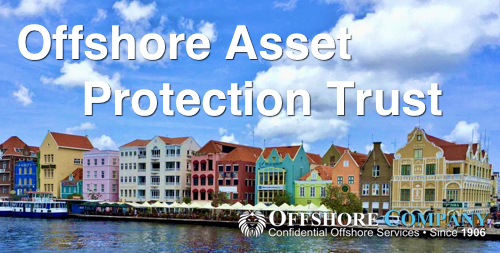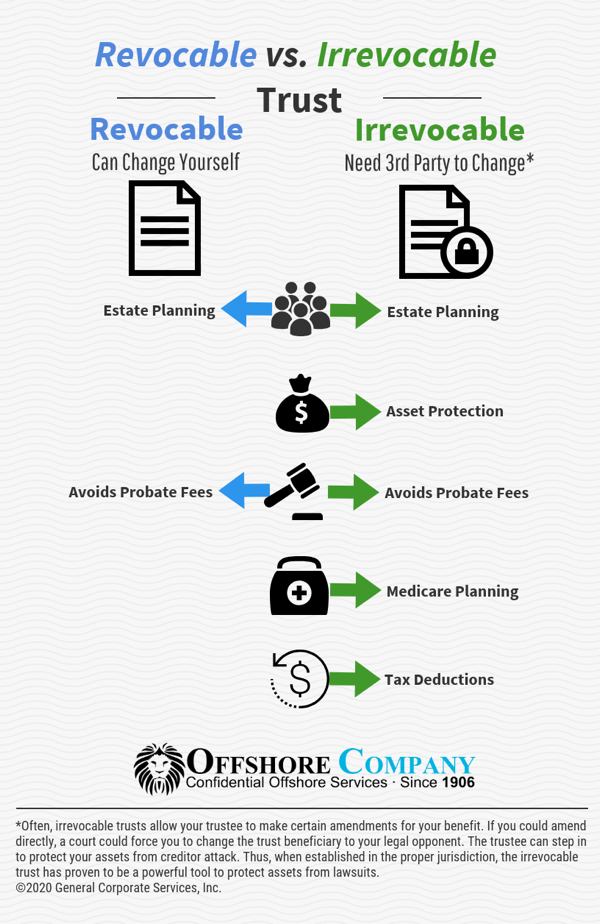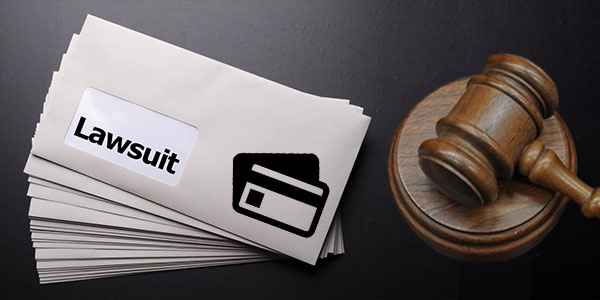When it comes to protecting the things in life that you’ve worked so hard for, you probably know that you need a good asset protection plan. Your plan should protect your money, property, investments, or other valuable items for your family and future generations. Creating an effective plan for valuable assets can be difficult within the United States, though. The legal tools aren’t strong and a results-oriented US judge can dismiss them. So, for the strongest asset protection planning many people in the Western world turn to asset protection structure outside of the nation’s borders. And one of the strongest tools to protect assets from lawsuits is the offshore asset protection trust properly structured in the right jurisdiction.

An offshore asset protection trust can be an effective way to protect your assets and ensure that you get the most out of them. But what is an offshore asset protection trust? Where should you create one? Why is it really better? This article will explore the answers to those questions as well as explain some of the considerations and paths to creating an offshore trust.
Video from our Asset Protection Planners affiliate.
What Is an Asset Protection Trust?
Before we can explore setting up an offshore asset protection trust, let’s discuss what exactly an asset protection trust is. Investopedia defines an asset protection trust as a vehicle for holding an individual’s assets. This vehicle primarily protects those assets from creditors. When the trust is set up well, this financial tool keeps creditors at bay. Alternatively, it allows creditors to settle with debtors on favorable terms and avoid expensive litigation.
All trusts have three main parties involved: the settlor (also called the trustor or grantor), the trustee, and the beneficiary. The settlor is the one who creates the trust. The settlor contributes the assets that the trust protects. The trustee manages the trust after creation for the benefit of the beneficiary. The beneficiary receives distributions from the trust. These distributions occur at the trustee’s discretion, with the settlor’s original intent in mind.

Revocable or Irrevocable Trust?
For a trust to qualify as an asset protection trust, it must be irrevocable. That means that after the trust has been established, one cannot readily change or cancel it directly without trustee intervention. Here is why. If a settlor or beneficiary could make changes directly, a judge could force that person to change the beneficiary to one’s legal enemy. So, making it irrevocable limits the court’s ability to force changes to the detriment of the parties to the trust. A spendthrift clause prevents beneficiaries from depleting the trust or promising payments to third parties. This clause also protects a beneficiary’s inheritance from creditor attacks.
Only a few states in the U.S. fully allow asset protection trusts. Some of the most popular are Alaska, Delaware, Nevada and South Dakota. A few more offer states offer these trusts with limitations. An individual can set up an asset protection trust in a state in which they don’t reside. But all domestic trusts operate within the confines of domestic law. Therefore, a California judge might ignore the asset protection provisions of a Nevada trust. The US judge has jurisdiction over the US trust and US trustee. US judges have little to no power over foreign trustees. So, for better protection, privacy, and benefits, the best choice is usually to go offshore. We establish offshore asset protection trusts wherein our offshore law firm serves as trustee.

Why Go Offshore?
As mentioned in the previous section, you can set up an asset protection trust right here in the U.S., regardless of the state in which you live. Why go through the hassle of putting your assets in an offshore trust then? As Nomad Capitalist explains, there are two main reasons for this: privacy and protection.
At the establishment of an offshore trust for asset protection, a trustee is designated. The trustee manages the assets, holds titles, and oversees property and any other assets placed into the trust. The trustee does this in a way that generally keeps the trustor and grantor out of the public records. Establishing a trust offshore also provides extra protection from your local courtroom. It is also tax-friendly as offshore trust taxation is typically tax neutral. So, it does not increase or decrease your taxes.

Beyond the Reach of the Local Courts
Moreover, it prevents a judge in your country from demanding that the trustee release funds or assets to a creditor. Again, foreign trustees are not subject to domestic courts. If a creditor did want to pursue those assets, they would have to go through a lengthy and expensive legal battle in the offshore trust’s jurisdiction. Plus, they would have to fight the battle in at atmosphere that is debtor-friendly. That’s a strong deterrent for creditors.
An offshore asset protection trust allows you to still access the benefits of your assets. At the same time, it secures them for future generations of your family. This financial tool also allows another party, your trustee, to advise you on ways to grow the assets that are held in the trust. One thing to note, though, is that the offshore asset protection trust cost may be a bit higher than the cost to set up a domestic asset protection trust. But keep in mind, price is what you pay. Value is what you get. A domestic trust may be a bit cheaper. But if a judge forces your US trustee to turn over all your assets, well, the offshore trust could be by far the least expensive option.

Offshore Asset Protection Trust for Divorce
When you’re facing a divorce, almost everything you own is vulnerable unless you have the right protection. Using a trust to protect assets in divorce is a smart move because those assets separate ownership from you, the trustor, as Forbes explains. An asset protection trust gives ownership of that asset to the trust itself, so that asset isn’t included in determining alimony or dividing assets. Some trusts even provide very specific clauses that state that a future ex-spouse has no claim against the trust property.
If you are a business owner, this can be especially beneficial. Offshore asset protection trusts provide protection for most entities, including C Corporations, Limited Liability Companies (LLCs), and Limited Partnerships. When a legal attack strikes, it is best to convert these domestic companies into foreign ones. This is because domestic judges have jurisdiction over domestic companies. Offshore asset protection trusts aren’t the best choice for S Corporations, as only domestic persons and certain types of domestic trusts can own them. Together, an offshore LLC and offshore asset protection trust can provide especially great benefits and strong protection.
If, instead of the settlor, you are the beneficiary of a trust, you can still have protection during divorce procedures. A beneficiary of a purely discretionary trust cannot extract payments from the trust on his or her own. The trust is only managed by the trustee, and beneficiary control violates the terms of the trust. Since beneficiaries can’t simply tap into their trust as an additional income source whenever they want, that income can’t be attributed to them for the purposes of determining alimony.

Rules and Clauses
In addition to the spendthrift clause mentioned above, there are a few other clauses to consider when creating your offshore asset protection trust. These additional clauses help protect the trust and ensure that they are valid when issues come up, BizFilings explains.
One important clause is the anti-duress clause. When triggered, this clause prevents the trustee form making a distribution from the trust when the trustor or beneficiary is making a withdrawal request undress duress. “Duress” is when a creditor has made a claim or obtained a judgment against the trustor or beneficiary outside of the foreign jurisdiction. The courts are demanding repatriation of the funds. This clause also prevents the creditor from making a claim against those assets without getting a new judgement in the offshore jurisdiction. And getting a judgment offshore is fighting an uphill battle. These jurisdictions are very unpleasant places for creditors as the laws are stilted in favor of the debtor.

How the Protector Protects You
Other clauses include the trust protector clause, flight clause, and choice of law clause. The trust protector clause names a protector for the trust that has the power to remove a trustee. In some cases, the protector can also veto some of the trustee’s actions. The flight clause allows the trustee to move the trust to another jurisdiction. Most often, the flight clause takes effect if a creditor does decide to file a suit in the offshore jurisdiction.
First, the creditor spends all the time and money to file an offshore lawsuit. Afterwards, the trustee can simply move the trust to another jurisdictions and make it inaccessible again. The choice of law clause explains that the trust is to be governed by the laws of the jurisdiction in which it is sited, not the jurisdiction of the trustor or beneficiary. This clause is what provides the judgement protection that makes offshore trusts so desirable.

Where to Put Your Offshore Trust
There are a lot of countries that have great asset protection trust benefits, but which one is right for you? The answer to that question will depend on what is most important to you and what assets you’re looking to protect. The Escape Artist cites the best offshore trust jurisdictions as being Belize, Cook Islands, Nevis, Luxembourg, Jersey, Cayman Islands, and British Virgin Islands.
As a U.S. citizen, it is likely that the Cook Islands or Nevis will be the best choice for you. These two jurisdictions have the most experience with U.S. clients. Their trust laws consider U.S. laws in their design. Nevis, Belize, Cayman Islands, and Cook Islands are the three best for tax matters. Their trust statutes work with the U.S. Internal Revenue Code. This in turn makes tax compliance and reporting easier. Not every country has the same local tax experts as these four.
However, there may be benefits in another country that are more appealing and worth a little extra work to set up your trust. Every individual’s needs are different, and there is a great variety of offshore options to suit any need.

The Privacy and Protection You Need
No matter which country you choose for your offshore asset protection trust, make sure you’re trusting experts to help you set it up. Laws surrounding offshore trusts can be complex, and mistakes could be very costly. Use the contact information on this page to talk to one of our offshore trust experts. We’ll help you understand your options, ensure that you are using the best offshore asset protection strategies, and help you set up your trust. We can also help connect you to our in-house U.S. attorney to coordinate all of the offshore issues that might come down the road.

